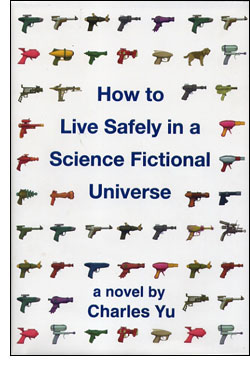 |
 |
 Charles Yu
Charles Yu
How to Live Safely in a Science Fictional Universe
Reviewed by: Rick Kleffel © 2010
P:antheon / Random House
USA Trade Hardcover, First Edition
ISBN 978-0-307-37920-7
Publication Date: 09-07-2010
256 pages, $24
Date Reviewed: 10-19-2010
Index:
Science Fiction
General Fiction
Charles Yu has managed to effectively trap himself in his own novel, 'How to Live Safely in a Science Fictional Universe.' He imagines himself as a narrator in a universe where time travel is cheap and easy. It's so easy, he's got a simple diagram at the front of the book to help explain it. But those explanations, and the story that follows, that envelops the reader, are all made of words. You cannot read all the words at once, even though they are all there for you to read at once. You cannot experience the whole story at once, even though it is all there for you to experience. No matter how you approach this novel, the novel itself makes it quite clear. Living a life — reading a book —experiencing a story — all of them are forms of time travel.
Yu's novel may put the words "science fictional" in the title, and time travel certainly plays a key part in the novel. But this is no science fiction novel. It's a memoir that uses fiction and a few of the trappings of science fiction to explore how our most powerful emotions are informed by time.
Yu's novel may be a memoir, but it is also a novel, so you won't get any verifiable "truthful" facts. But readers will not be able to help experiencing the truth of Yu's emotions, and the way he gets at them is by cross-pollinating literary and critical theory with scientific literary style. Somewhere in this very odd and utterly unique mix, Yu explores the relationships between fathers and sons with undeniable and memorable poignancy and total originality.
As the novel begins, the narrator, Charles Yu, is locked in a small time-travel box with only a couple of electronic constructs to keep him company; TAMMY, the female software program that helps run his time machine and keeps him company and Ed, his ontological dog. Charles is a time-machine repairman in a "minor universe" where time travel is common, but used mainly to visit scenes of regret in one's life. But soon Charles finds himself in a time loop with potentially fatal results. In order to survive his own life, he's going to explore that life. Time travel of the literary sort will be required.
'How to Live Safely in a Science Fictional Universe' unfolds as we the readers and Charles Yu the narrator get to know Charles Yu. Charles' father — who invented the time machine — is a difficult figure for Charles to know. Sure, he has all the memories, but putting them into not just chronological order, but more importantly emotional order, is something that cannot happen in an instant, and cannot happen without language. Yu's novel is chock-a-block with an abandoned appendix's worth of neologisms, which he deploys to add a lighthearted humor that offsets the more poignant memories of his father. The prose here is unique. It's funny, it's sad, it's rife with pseudo-linguistic and pseudo-scientific jargon, often all of these at the same time. It's an effective way to talk about 21st century men and their fathers.
For all the wildly imaginative time-travel trappings that this novel brings to the reader, the characters within are instantly recognizable members of a family that is not so unusual. Charles Yu the son looks up to his flawed father and feels the terror of his failings. This is a fairly simple story and straightforward relationship that is made unique and entertaining by virtue of Yu's virtuoso language.
'How to Live Safely in a Science Fictional Universe' evades your expectations of almost any label you might care to apply to it. The science fiction is rigorously worked out but within literary parameters. The literary experimentation is performed in the name of old-fashioned emotions. The powerful feelings are explored with funny neologisms. And the funny neologisms explore some seriously complex literary constructions. 'How to Live Safely in a Science Fictional Universe' is a powerful story of a father and son written on a Möbius strip.
|
 |
|
|
 |
| |
Review Archive
All Reviews alphabetized by author.
General Fiction
Non-Genre, general fiction and literature.
Horror
Supernatural fiction, supernatural horror and non-supernatural horror.
Science Fiction
Science fiction, science fantasy, speculative fiction, alternate history.
Fantasy
Fantasy, surrealism and magic realism.
Mystery
Crime, thrillers, mystery, suspense.
Non-Fiction
Non-Fiction, True Crime, Forteana, Reference.
Poetry
|
|
 |
|




